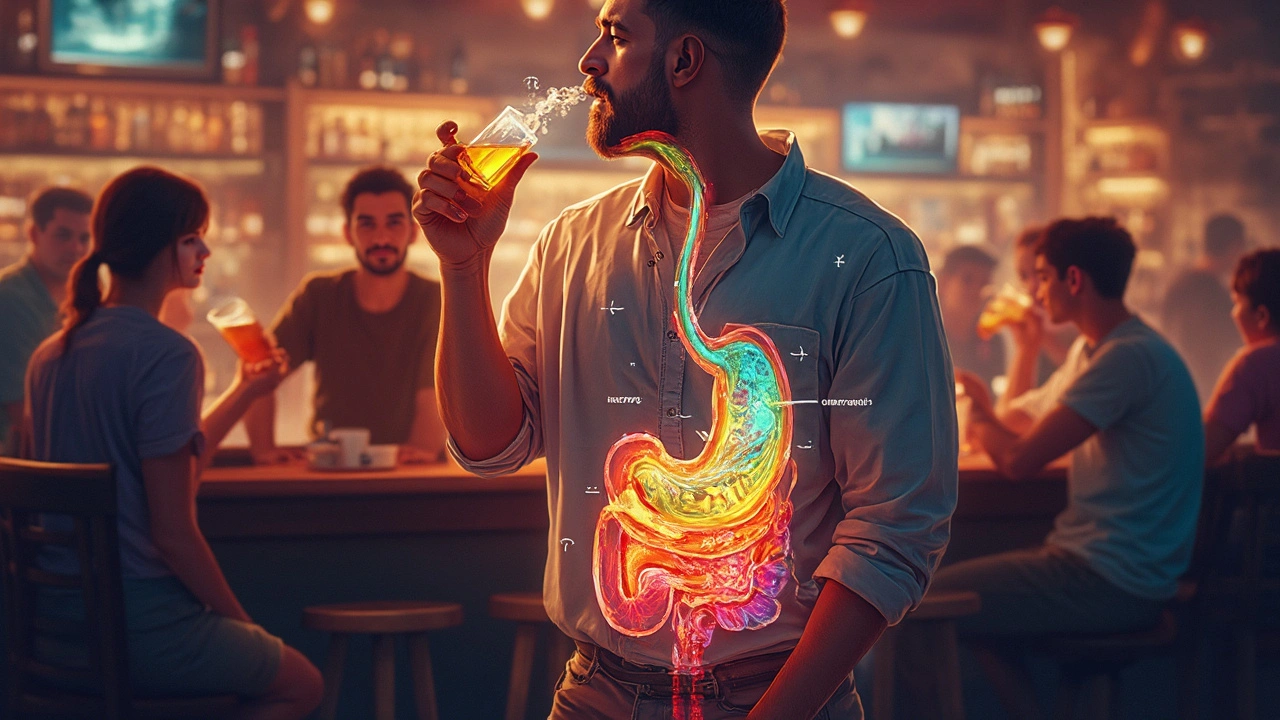What Happens When You Take Omeprazole?
Let’s get something straight right away—omeprazole isn’t just another pill in your medicine cabinet. This little capsule is a PPI—proton pump inhibitor—which basically shuts down acid production in your stomach. For people dealing with heartburn, acid reflux, or ulcers, omeprazole is like a firefighter for a five-alarm digestive blaze. It targets those acid pumps on the lining of your stomach and tells them, “Take a break.” That means way less acid burning up your esophagus or gnawing on that ulcer crater. Here’s a cool fact: most people pop one pill in the morning, and the effects last all day. It’s not a quick fix; it’s a long game, helping your body heal from chronic acid insults.
But have you ever wondered why heartburn always seems to come back if you quit for even a few days? That’s because your stomach cells regenerate, and they can ramp up acid again when the omeprazole wears off. For the drug to work well, a steady state is key—consistency matters more than doubling up on bad days.
One thing people get wrong: omeprazole doesn’t block the acid you’ve already got bubbling in your stomach. It just cuts off the supply line. So, if you eat a chili burger and down an energy drink, the discomfort you feel isn’t gone instantly. You’re playing the long game; by tomorrow, you’ll probably thank yourself for sticking with it.
Doctors like omeprazole because it has fewer bad side effects compared to older acid blockers, but that doesn’t mean it’s bulletproof. Your whole digestive tract depends on acid to break down food, absorb key nutrients (like B12 and magnesium), and fend off nasty bacteria. Mess too much with this system, and you might notice some weird new symptoms: bloating, belly pain, or food just not sitting right. Always keep your doctor in the loop about how you feel on these meds. Sometimes the fix for a fire can leave you with water damage.
How Alcohol Changes Your Stomach’s Acid Balance
If you thought a beer or glass of wine was just a harmless way to relax, your stomach might disagree. Alcohol isn’t gentle on your digestive system. Even one drink sends your stomach into a juggling act—at first, it may trigger more acid production, making your heartburn worse. Some studies have clocked as much as a 30% increase in acid output after moderate drinking. That’s a lot if your stomach’s already sensitive.
But it gets twisty. After the initial acid spike, especially with lots of alcohol, your stomach can actually slow down. It gets confused, and the acid levels may drop, but not in the balanced way PPIs create. Your stomach lining can take a hit, too. Ethanol, the stuff inside beer, wine, or liquor, can inflame or even erode the lining, making you more prone to pain and bleeding. You’ll sometimes notice this as nausea or that sharp stomach twinge after a couple of drinks on an empty stomach.
Alcohol also messes with the “gatekeepers” between your stomach and esophagus—the lower esophageal sphincter. When you drink, this muscle relaxes a bit too much, letting acid sneak up and cause reflux. That’s why some people swear their heartburn is worse after a happy hour.
Your stomach isn’t working alone here, either. Alcohol holds up digestion by making your stomach sluggish. Food and drinks can slosh around longer, keeping acid and whatever you’ve eaten in contact for more time. It can set the stage for more reflux or discomfort, even when you’re taking your acid-blocking meds.
If you’re dealing with a gnarly hangover and “morning after” heartburn, it’s not your imagination. Your body’s playing catch-up from a digestive hijack. Even light drinkers feel these effects if they’re sensitive, while heavy drinkers actually increase their risk for stomach ulcers, bleeding, and all sorts of GI messes. It’s a reminder that your gut’s chemistry set is pretty delicate—especially when you’re adding outside substances like alcohol into the mix.

Mixing Omeprazole with Alcohol: What Really Happens?
If you’re already popping omeprazole, you’re trying to lower your stomach acid on purpose. Now, toss alcohol in—a substance that can both increase and decrease stomach acid, irritate the stomach lining, and weaken the muscles protecting your esophagus. That’s a recipe for unpredictable results. The way alcohol interacts with omeprazole isn’t a simple on/off switch; it’s a tug of war inside your stomach.
Let’s break down what actually goes on. After you take omeprazole in the morning, your body’s new plan is to reduce stomach acid levels for at least 24 hours. But alcohol pulls in the other direction, signaling your stomach to pump out more acid, at least at first. If you drank heavily the night before, omeprazole’s effect might get overridden, especially if you take the medication inconsistently or at random times. That means you might still feel the burn, even though you’re technically “protected” by the PPI.
This conflict can change from person to person. Some folks—especially those with weakened stomach linings—will feel the pain right away; others might notice fatigue, bloating, or weird changes in appetite. There’s another wrinkle: alcohol may slow the rate at which omeprazole is absorbed. If your stomach is busy dealing with alcohol, food, or stress, the pill you swallowed could take longer to start working, or it might not work as well that day. Timing your dose away from drinking is smart if you want consistent relief.
What about long-term consequences? Here’s where it gets tricky. Regular drinking, especially if you’re using omeprazole for months, can increase your odds of vitamin B12 deficiency, trouble with magnesium, or even odd infections like C. difficile (a nasty gut bug). Why? You’re combining two acid disruptors at the same time, changing your stomach’s natural defenses. You may also notice bruising, tiredness, or strange muscle cramps—classic signs your digestion and absorption are off.
Some research even suggests alcohol can boost certain side effects of PPIs, like headache, drowsiness, or a general foggy feeling. None of this means you can’t have a drink with dinner—but if you’re in the habit of nightly drinking, your PPI might have a much harder time keeping up. For tips on how to time doses, stay out of the danger zone with interactions, and learn more about omeprazole and alcohol, make sure you check out solid, up-to-date info from people who know the science.
Here’s something people miss all the time: moderation is your friend, especially if your stomach’s health is already a work in progress.
Tips and Smart Habits for Mixing Omeprazole and Alcohol
Navigating life with heartburn (or an ulcer) shouldn’t mean sitting out every toast or night out. But making a couple of simple changes can help you avoid waking up with that nasty taste in your throat. Start with your omeprazole: take it in the morning, about 30-60 minutes before food, and give it plenty of time to kick in. If you know you’ll be drinking later, try to keep your drink and your pill a few hours apart. It’ll help your body absorb both better, and your meds will do their job without extra confusion from alcohol’s chemical circus.
Stay hydrated. Alcohol dehydrates you, which can make heartburn and ulcer symptoms worse. Water is boring, but it’s your ally here. Eating before or with your drink helps, too—it gives your stomach something to buffer the alcohol, keeps acid production steadier, and can blunt that initial spike in irritation.
Not all drinks are created equal. Red wine and dark liquors are infamous heartburn triggers, while some folks do okay with lighter beers or clear spirits in small amounts. Pay attention to your triggers. If one kind always leaves you with burning or reflux, make the swap, or skip it entirely. And let’s be real: shotgunning six beers probably isn’t in your best gut-health plan if you’re on omeprazole.
Worried you might land in the trouble zone? Here are some symptoms you shouldn’t ignore: sudden severe stomach pain, black or bloody stools, vomiting blood, or relentless nausea that omeprazole doesn’t fix. These can be signs your stomach lining is in trouble or you’ve sprung a leak—rare, but not impossible, if you mix the wrong meds with too much alcohol. When in doubt, talk to your doctor before making changes to your meds or your drinking habits.
A quick checklist for people pairing omeprazole and alcohol:
- Take your PPI at the same time each day, ideally before breakfast.
- Space out alcohol and omeprazole doses by several hours.
- Stay hydrated and avoid drinking on an empty stomach.
- Track your symptoms and stick to what triggers you the least.
- If you need to drink, limit yourself—think ‘nurse a drink’ not ‘down the line.’
Smart habits make a world of difference. Even if you’ve struggled with wild heartburn flares after drinks in the past, you can often find a routine that keeps both your social life and your stomach happy. Stay vigilant, listen to your body, and keep the lines open with your healthcare provider. With the right balance, omeprazole and alcohol don’t have to be natural enemies—just long-term frenemies who need some space apart.

